ROBIN HOOD
That, my friends, was a good Robin Hood.
Pre-ramble
Now, Robin Hood is a story I love to death. I have loved it in many forms (except for the Kevin Costner one). I've read fair amount about the histories of some of the real people connected with the stories (Plantagenet party!), I've puzzled over maps, I've wondered about accents, thought about forest density, and pondered Rob's identity (yeoman/nobleman). In short, I've invested enough of my time into this subject to care a good deal and to have developed a girlycrush on Eleanor (though who hasn't?). I'm not an expert, I just care. So, from that perspective: the 2010 "Robin Hood"!

I'm going to tackle this in a few different points
Historical placement
Most of the original RH tales didn't have any particular historical setting. For the purposes of such tales, no setting was really necessary - it would've been like clearly defining who was president in "The Good, The Bad, & The Ugly": interesting, but irrelevant.
We have inherited, however, the later tradition of putting Robin Hood in the context of two Plantagenet Kings: Richard (r.1189-1199), and his younger brother, John (r.1199-1216). John's move for power when his elder brother was out crusading is universally vilified, and certain movies have played this up: in "The Adventures of Robin Hood" starring Errol Flynn, John is exiled. But that movie was filmed in the same golden age that produced "Song of the South", so we can't exactly demand historical accuracy. :P

Too clean to be medieval
The Russel Crowe "Robin Hood" follows the Planagenet-placement trend, but it does it excellenty and, more importantly, believably. Sometimes, Richard or John feel awkwardly shoehorned in , leaving us to wonder "why is the king wandering around Sherwood Forest?". By making yeoman Robin Longstride blunder into the murderous politics of the period and assume the role of a nobleman makes things like John's tolerance of him less incredible.
On a similar note, the complexity of the historical situation was really well-handled. No faults were attributed to antagonist characters like King John that were not his own: his tax collecting was explained so that the audience didn't have to deal with a 2D character who just wanted money... because.
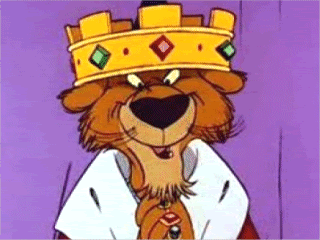
Money: why not?
P.S. Yes, I know it's only Disney.
Likewise, we got to see that it all wasn't John's fault. Although "Lionheart" is much caressed by Hollywood, the film brought up the massacre at Acre which Richard commanded. Politically deft, as well as historically correct!
Other points:
+ ELEANOR OF MOTHERF**KING AQUITAINE
+ Cameos from Isabel of Gloucester, John's first wife, whom we briefly meet, and
+ Isabella of Angoulême, the French princess whom John eventually married WHEN SHE WAS 13. I made a fanmix for her.
+ Not making Richard gay. I think it's just too dubious as far as supporting evidence goes, but they could've. It might've created box-office stimulating controversy or something.
- No Arthur of Brittany. Understandable, but I had to mention it, given that he was a contender against John for the throne.
- Richard wasn't played by either Brian Blessed or Jonathan Rhy-Davies. He should've been.
Score: A+
Yeoman/nobleman ; Saxon/Norman
These two questions of Robin Hood's identity are handled very cleverly. Historically speaking, we're fairly confident that, if there even was one man on whom the legends are based, he was a yeoman or a peasant and not a nobleman.
The idea of Robin Hood as a nobleman, usually the Earl of Huntingdon, was a product of the later-medieval/renaissance period. The gentrified Robin is also, unsurprisingly, more chivalrous than the earlier "Robins" (i.e. he's not quite such a bad loser, and he doesn't take to robbing random peddlers).
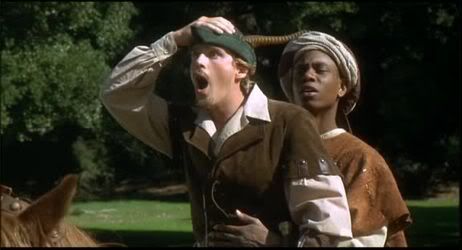
So curteyse an outlawe as he was one / Was nevere non founde.
Nonetheless, we seem to like the drama of the fall of Robert the nobleman to becoming our merry man of the Greenwood, so the "noble" Robin is the one we often expect. I think the coolest interpretation of the "common vs. noble" Robin Hood was that of the 1980s TV show, "Robin of Sherwood", in which the name "Robin Hood" was treated as a title which could be passed on (SPOILER HAHA). But I think the Russel Crowe "Robin Hood" comes in a close second: the ruse of Longstride as Loxley was a bit weird, but it certainly worked.
This brings me to the second dichotomy: in the 2010 movie, the elder Lord Loxley mentions that Longstride is "a good Saxon name". This is as close to the full-blown Saxon-Norman standoff that we inherited from folks like Sir Walter Scott, which is often seen in most Robin Hood movies and TV shows. The historical accuracy of making this focus of Robin Hood is, like most of the legend, contestable. It does, however, invoke myths of previous historical figures like Hereward the Wake.
Hereward was the leader of an Anglo-Saxon resistance movement against the conquering Normans. If you have to ask how that went, I'll give you a hint: in English, we use the word "conquer". Nonetheless, Hereward's legends persisted long after his death and were later incorporated into the Robin Hood mythos.
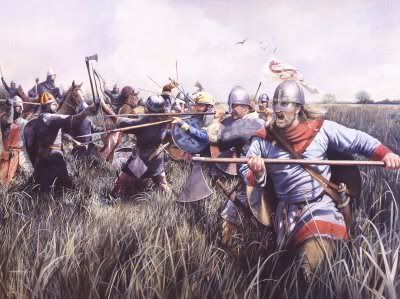
Saxons vs Normans: Blonde, Germanic-tribal catfight! Hot!
Since we can't know whether people were still bitter about being conquered over a century after the Norman conquest, this is an optional feature of the tale. However, the legacy of the Conquest was still well and alive in English political life at the time. Richard the Lionheart reputedly spoke little English. So, for example, the fact that Godfrey was pillaging in the name of King John accompanied by a horde of French-speakers might have looked fairly legitimate from an English peasant's point of view: the ruling minority all spoke French (well, Norman French, to be exact). Surely that could've raised some gratifying angst and drama, highlighting the greater similarities between the invading French and the Normans than the Normans and their subjects?
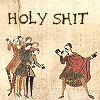
The 2010 "Robin Hood" opts to not mention any Saxon-Norman conflict. By not touching on this factor, I think the film misses out on an opportunity to make the situation even more nuanced and enjoyable. It would pit a common Saxon yeoman, in alliance with a Saxon noble (Loxley?), against the Norman nobles; then everyone unites to fight off the French.
Score: B
Ballads as a source
I think this is where most people take issue with the film. The movie is called "Robin Hood", so we expect a quarterstaff fight on a tiny bridge, we expect the archery contest for the gold and/or silver arrow, we expect the Sheriff of Nottingham (and Guy of Gisbourne!), we expect river-fording on a friar's back, and we expect Merry Men! We expect the fun and frolicsome popular exploits from the Robin Hood ballads. We do not get these things.
Instead, what we get is this movie:
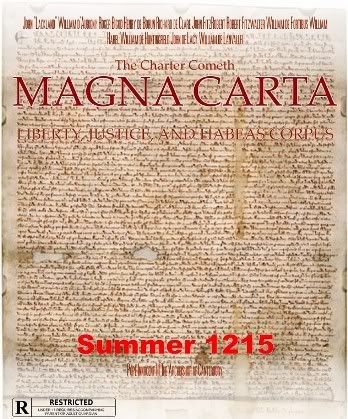
Cue whining.
Admittedly, they tell us at the beginning of the movie that the movie is the story of how Robin Hood became Robin Hood, but I suspect this let a lot of people down.
This said, as I'm still judging the movie under the rubric of whether it paid attention to the ballad tradition. In this, we at least get Maid Marion, Little John, Will Scarlet, Friar Tuck, et. al. Hell, the fact that Robin Hood is often supposed to have been from Yorkshire was even referenced in the accent that Crowe used.
So, given that this is a grade largely based on the movie giving us exactly what we expect and not surprising us, I can't really give it an amazing grade. But within the limits of its new story, this movie gave us what we wanted. So the final grade is...
Score: B
History as a source
As I said, this is basically "Robin Hood & The Magna Carta". But it may be that only those of us who wear big shiny history nerd hats (or those who paid any attention in school) noticed this. We also may have wanted to nitpick the movie for not being historically accurate (did I just see D-Day on the Cliffs of Dover?). However, a screenplay is not an academic journal, so we should also probably just be glad that they didn't churn out another Kevin Costner Robin Hood. We have to celebrate that we got a full cast of Plantagenets, after all. And there are those among us who are probably pretty excited that we nearly did get "Magna Carta: The Movie". I am.
So, all in all, I think this movie did an amazing job of paying attention to historical detail. I don't mean that they tried to make a believable Robin Hood - the real guy was probably just a criminal like Colton Harris Moore: popular, but not exactly "robbing from the rich to give to the poor". I mean that for what they were working on, they really tried to do things properly. People looked dirty and smelly, the battles were't all purtified, the costumes weren't wildly anachronistic, and no-one is trying to force bizarre versions of history down my throat.
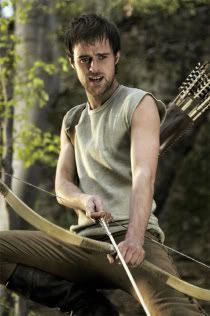
Ridiculous.
Score: A
Overall Score: A-
Pre-ramble
Now, Robin Hood is a story I love to death. I have loved it in many forms (except for the Kevin Costner one). I've read fair amount about the histories of some of the real people connected with the stories (Plantagenet party!), I've puzzled over maps, I've wondered about accents, thought about forest density, and pondered Rob's identity (yeoman/nobleman). In short, I've invested enough of my time into this subject to care a good deal and to have developed a girlycrush on Eleanor (though who hasn't?). I'm not an expert, I just care. So, from that perspective: the 2010 "Robin Hood"!

I'm going to tackle this in a few different points
Historical placement
Most of the original RH tales didn't have any particular historical setting. For the purposes of such tales, no setting was really necessary - it would've been like clearly defining who was president in "The Good, The Bad, & The Ugly": interesting, but irrelevant.
We have inherited, however, the later tradition of putting Robin Hood in the context of two Plantagenet Kings: Richard (r.1189-1199), and his younger brother, John (r.1199-1216). John's move for power when his elder brother was out crusading is universally vilified, and certain movies have played this up: in "The Adventures of Robin Hood" starring Errol Flynn, John is exiled. But that movie was filmed in the same golden age that produced "Song of the South", so we can't exactly demand historical accuracy. :P
Too clean to be medieval
The Russel Crowe "Robin Hood" follows the Planagenet-placement trend, but it does it excellenty and, more importantly, believably. Sometimes, Richard or John feel awkwardly shoehorned in , leaving us to wonder "why is the king wandering around Sherwood Forest?". By making yeoman Robin Longstride blunder into the murderous politics of the period and assume the role of a nobleman makes things like John's tolerance of him less incredible.
On a similar note, the complexity of the historical situation was really well-handled. No faults were attributed to antagonist characters like King John that were not his own: his tax collecting was explained so that the audience didn't have to deal with a 2D character who just wanted money... because.

Money: why not?
P.S. Yes, I know it's only Disney.
Likewise, we got to see that it all wasn't John's fault. Although "Lionheart" is much caressed by Hollywood, the film brought up the massacre at Acre which Richard commanded. Politically deft, as well as historically correct!
Other points:
+ ELEANOR OF MOTHERF**KING AQUITAINE
+ Cameos from Isabel of Gloucester, John's first wife, whom we briefly meet, and
+ Isabella of Angoulême, the French princess whom John eventually married WHEN SHE WAS 13. I made a fanmix for her.
+ Not making Richard gay. I think it's just too dubious as far as supporting evidence goes, but they could've. It might've created box-office stimulating controversy or something.
- No Arthur of Brittany. Understandable, but I had to mention it, given that he was a contender against John for the throne.
- Richard wasn't played by either Brian Blessed or Jonathan Rhy-Davies. He should've been.
Score: A+
Yeoman/nobleman ; Saxon/Norman
These two questions of Robin Hood's identity are handled very cleverly. Historically speaking, we're fairly confident that, if there even was one man on whom the legends are based, he was a yeoman or a peasant and not a nobleman.
The idea of Robin Hood as a nobleman, usually the Earl of Huntingdon, was a product of the later-medieval/renaissance period. The gentrified Robin is also, unsurprisingly, more chivalrous than the earlier "Robins" (i.e. he's not quite such a bad loser, and he doesn't take to robbing random peddlers).

So curteyse an outlawe as he was one / Was nevere non founde.
Nonetheless, we seem to like the drama of the fall of Robert the nobleman to becoming our merry man of the Greenwood, so the "noble" Robin is the one we often expect. I think the coolest interpretation of the "common vs. noble" Robin Hood was that of the 1980s TV show, "Robin of Sherwood", in which the name "Robin Hood" was treated as a title which could be passed on (SPOILER HAHA). But I think the Russel Crowe "Robin Hood" comes in a close second: the ruse of Longstride as Loxley was a bit weird, but it certainly worked.
This brings me to the second dichotomy: in the 2010 movie, the elder Lord Loxley mentions that Longstride is "a good Saxon name". This is as close to the full-blown Saxon-Norman standoff that we inherited from folks like Sir Walter Scott, which is often seen in most Robin Hood movies and TV shows. The historical accuracy of making this focus of Robin Hood is, like most of the legend, contestable. It does, however, invoke myths of previous historical figures like Hereward the Wake.
Hereward was the leader of an Anglo-Saxon resistance movement against the conquering Normans. If you have to ask how that went, I'll give you a hint: in English, we use the word "conquer". Nonetheless, Hereward's legends persisted long after his death and were later incorporated into the Robin Hood mythos.

Saxons vs Normans: Blonde, Germanic-tribal catfight! Hot!
Since we can't know whether people were still bitter about being conquered over a century after the Norman conquest, this is an optional feature of the tale. However, the legacy of the Conquest was still well and alive in English political life at the time. Richard the Lionheart reputedly spoke little English. So, for example, the fact that Godfrey was pillaging in the name of King John accompanied by a horde of French-speakers might have looked fairly legitimate from an English peasant's point of view: the ruling minority all spoke French (well, Norman French, to be exact). Surely that could've raised some gratifying angst and drama, highlighting the greater similarities between the invading French and the Normans than the Normans and their subjects?

The 2010 "Robin Hood" opts to not mention any Saxon-Norman conflict. By not touching on this factor, I think the film misses out on an opportunity to make the situation even more nuanced and enjoyable. It would pit a common Saxon yeoman, in alliance with a Saxon noble (Loxley?), against the Norman nobles; then everyone unites to fight off the French.
Score: B
Ballads as a source
I think this is where most people take issue with the film. The movie is called "Robin Hood", so we expect a quarterstaff fight on a tiny bridge, we expect the archery contest for the gold and/or silver arrow, we expect the Sheriff of Nottingham (and Guy of Gisbourne!), we expect river-fording on a friar's back, and we expect Merry Men! We expect the fun and frolicsome popular exploits from the Robin Hood ballads. We do not get these things.
Instead, what we get is this movie:

Cue whining.
Admittedly, they tell us at the beginning of the movie that the movie is the story of how Robin Hood became Robin Hood, but I suspect this let a lot of people down.
This said, as I'm still judging the movie under the rubric of whether it paid attention to the ballad tradition. In this, we at least get Maid Marion, Little John, Will Scarlet, Friar Tuck, et. al. Hell, the fact that Robin Hood is often supposed to have been from Yorkshire was even referenced in the accent that Crowe used.
So, given that this is a grade largely based on the movie giving us exactly what we expect and not surprising us, I can't really give it an amazing grade. But within the limits of its new story, this movie gave us what we wanted. So the final grade is...
Score: B
History as a source
As I said, this is basically "Robin Hood & The Magna Carta". But it may be that only those of us who wear big shiny history nerd hats (or those who paid any attention in school) noticed this. We also may have wanted to nitpick the movie for not being historically accurate (did I just see D-Day on the Cliffs of Dover?). However, a screenplay is not an academic journal, so we should also probably just be glad that they didn't churn out another Kevin Costner Robin Hood. We have to celebrate that we got a full cast of Plantagenets, after all. And there are those among us who are probably pretty excited that we nearly did get "Magna Carta: The Movie". I am.
So, all in all, I think this movie did an amazing job of paying attention to historical detail. I don't mean that they tried to make a believable Robin Hood - the real guy was probably just a criminal like Colton Harris Moore: popular, but not exactly "robbing from the rich to give to the poor". I mean that for what they were working on, they really tried to do things properly. People looked dirty and smelly, the battles were't all purtified, the costumes weren't wildly anachronistic, and no-one is trying to force bizarre versions of history down my throat.

Ridiculous.
Score: A
Overall Score: A-